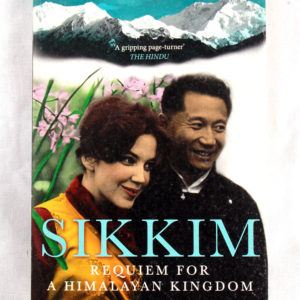The Art of War
₨ 318.00
The Art of War is a book which should be used to gain advantage of opponents in the boardroom and battlefield alike.
- Categories: History, Non-Fiction
- Tags: left books, Sun Tzu, the art of war
Twenty-Five Hundred years ago, Sun Tzu wrote this classic book of military strategy based on Chinese warfare and military thought. Since that time, all levels of military have used the teaching on Sun Tzu to warfare and civilization have adapted these teachings for use in politics, business and everyday life. The Art of War is a book which should be used to gain advantage of opponents in the boardroom and battlefield alike.
Related products
Translated from the Hindi by Madhu Singh With a foreword by Angela Y. Davis
September 1970. Ramchandra Singh enters the Hardoi District Jail in Uttar Pradesh as a naxalite undertrial. Barely twenty, his life of expanding prospects—in studies, politics and love—is reduced to the horizon of a life term. The odds are stacked against the survival of his humanity and imagination, but Singh regenerates his gifts of empathy, humour, reflection and, above all, language—in a secret diary smuggled out with the help of friends.
A singular record of recent history and of individual witness, Singh’s prison diary, newly expanded, appears in English for the first time. Offering unprecedented intimacy with the everyday life of the imprisoned everyman, Singh challenges us to look without flinching and question our assumptions about crime and punishment.
Ramchandra Singh (1949–2018), of Bangarmau village in Unnao district of Uttar Pradesh, was a member of the Communist Party of India (Marxist–Leninist) Red Star, and served on its Central Committee. He was part of the editorial board of Red Star Monthly (Hindi). He passed away when this book was in press.
Madhu Singh is a professor in the Department of English and Modern European Languages, University of Lucknow. She has previously translated the scholar G.N. Devy’s work, A Nomad Called Thief, into Hindi as Ghumantu Hain Chor Nahin.
This is the true story of Sikkim, a tiny Buddhist kingdom in the Himalayas that survived the end of the British Empire only to be annexed by India in 1975.It tells the remarkable tale of Thondup Namgyal, the last King of Sikkim, and his American wife, Hope Cooke, thrust unwittingly into the spotlight as they sought support for Sikkim’s independence after their ‘fairytale’ wedding in 1963. As tensions between India and China spilled over into war in the Himalayas, Sikkim became a pawn in the Cold War in Asia during the 1960s and 1970s. Rumours circulated that Hope was a CIA spy. Meanwhile, a shadowy Scottish adventuress, the Kazini of Chakung, married to Sikkim’s leading political figure, coordinated opposition to the Palace. As the world’s major powers jostled for regional supremacy during the early 1970s Sikkim and its ruling family never stood a chance. On the eve of declaring an Emergency across India, Indira Gandhi outwitted everyone to bring down the curtain on the 300 year-old Namgyal dynasty.Based on interviews and archive research, as well as a retracing of a journey the author’s grandfather made in 1922, this is a thrilling, romantic and informative glimpse of a real-life Shangri-La.
The classic collection of sixteen sermons preached and compiled by Dr. King
As Dr. King prepared for the Birmingham campaign in early 1963, he drafted the final sermons for Strength to Love, a volume of his most best-known homilies. King had begun working on the sermons during a fortnight in jail in July 1962. While behind bars, he spent uninterrupted time preparing the drafts for works such as “Loving Your Enemies” and “Shattered Dreams,” and he continued to edit the volume after his release. A Gift of Love includes these classic sermons, along with two new preachings. Collectively they present King’s fusion of Christian teachings and social consciousness, and promote his prescient vision of love as a social and political force for change.
Stretcher-Bearer of Empire
In the pantheon of global liberation heroes, Mohandas Karamchand Gandhi has pride of place. Leaders like Mandela have lauded him as being part of the epic battle to defeat the white regime and prepare the way for a non-racial country. A popular sentiment in South Africa goes: ‘India gave us Mohandas, and we returned him to you as Mahatma’.
Against this background, The South African Gandhi: Stretcher-Bearer of Empire unravels the complex story of a man who, throughout his stay on African soil (1893–1914), remained true to Empire while expressing disdain for Africans. For Gandhi, whites and Indians were bound by an Aryan bloodline that had no place for the African. His racism was matched by his class (and caste) prejudice towards the Indian indentured. He persistently claimed that they were ignorant and needed his leadership, and wrote their struggles out of history—struggles this book documents.
The authors show that Gandhi never missed an opportunity to demonstrate his loyalty to Empire, with a particular penchant for war. He served as stretcher-bearer in the war between Brit and Boer, demanded that Indians be allowed to carry fire-arms, and recruited volunteers for the imperial army in both England and India during the First World War.
Ashwin Desai is Professor of Sociology at the University of Johannesburg. His previous books include South Africa: Still Revolting, ‘We are the Poors’: Community Struggles in Post-Apartheid South Africa and Reading Revolution: Shakespeare on Robben Island among others.
Goolam Vahed is Associate Professor of History at the University of KwaZulu Natal. He writes on histories of migration, ethnicity, religion, and identity formation among Indian South Africans.






Reviews
There are no reviews yet.